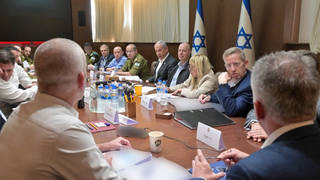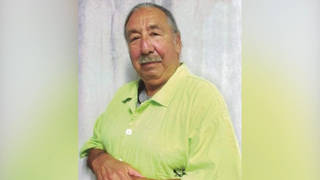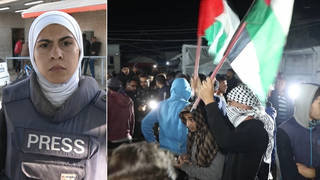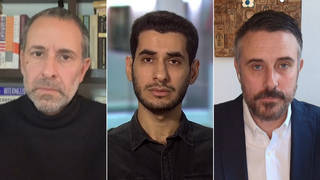HeadlinesAugust 26, 2013
U.N. Inspectors Come Under Fire after Syrian Regime OKs Visit
Syria has agreed to allow a U.N. inspection of the site of an alleged chemical weapons attack that killed hundreds of people near Damascus last week. A ceasefire was announced for the area during the inspectors’ visit. On Sunday, a spokesperson for the group Doctors Without Borders said three hospitals in the area had reported a death toll of 355, with symptoms resembling those from a chemical attack.
Christopher Stokes: “We have been putting together a picture of what happened during that night. What they have told us and the information we have received is that 3,600, approximately, patients were received, and 355 died, and a vast number of these patients presented symptoms that would be linked to a neurotoxic agent attack.”
Earlier today, a convoy carrying the U.N. inspectors came under fire as they made their made way to Ghouta. The Syrian government has blamed rebels for the attack.
U.S. Says Syria Inspection “Too Late” as Obama Weighs Military Options
Speculation has grown around whether the United States and other world powers will launch military action in the aftermath of the alleged chemical attack in Ghouta. On Sunday, an unnamed U.S. official told reporters “there is very little doubt that a chemical weapon was used by the Syrian regime against civilians.” The official added Syria’s acceptance of a U.N. inspection was “too late to be credible,” in part because the remaining evidence has been corrupted since the attack took place. President Obama reportedly weighed military options for Syria in a meeting Saturday with top aides. The chair of the Joint Chiefs of Staff, General Martin Dempsey, is discussing Syria today at a meeting with foreign counterparts in Jordan.
Tens of Thousands Mark 50th Anniversary of March for Jobs and Freedom
Tens of thousands of people gathered in Washington, D.C., on Saturday to mark the 50th anniversary of the March on Washington for Jobs and Freedom, originally held on August 28, 1963. Democratic Rep. John Lewis of Georgia, the only surviving speaker from the 1963 march, said the struggle for racial and economic justice continues today.
Rep. John Lewis: “We are one people. We are one family. We are one house. We all live in the same house. So I say to you, my brothers and sisters, we cannot give up. We cannot give out. We cannot give in. We must get out there and push and pull.”
NSA Spied on U.N. Internal Video System, 80 Embassies
The latest disclosures from whistleblower Edward Snowden have provided more details on how the National Security Agency has spied on the United Nations and countries worldwide. Citing Snowden’s leaks, the German magazine Der Spiegel reports the NSA decoded the U.N.'s internal video conferencing system to eavesdrop last year. One NSA official wrote: “the data traffic gives us internal video teleconferences of the United Nations. (yay!)” The spying on U.N. communications would violate the U.N.'s Espionage Act. Overall, an NSA operation called “Special Collection Services” bugged or monitored some 80 embassies and consulates around the world, including the European Union offices near the U.N.'s New York headquarters as well as the International Atomic Energy Agency. According to Der Speigel, the NSA's embassy spy program “has little or nothing to do with warding off terrorists.”
U.S. Paid Millions to Cover Tech Firms’ Costs for NSA Compliance
In another new revelation, leaks from Edward Snowden show the National Security Agency has paid millions of dollars to cover the tech companies’ expenses for complying with the PRISM surveillance program. Through PRISM, the NSA has reportedly tapped directly into the networks of tech giants including Yahoo, Google, Microsoft and Facebook to collect users’ data. The companies have denied direct involvement in PRISM, but the latest disclosures show they were paid millions of dollars for taking part.
Dozens Killed in Iraq Violence
At least 47 people were killed in Iraq on Sunday in a series of attacks. More than 1,000 Iraqis were killed in July, the highest monthly toll since 2008.
Farmers Lead Nationwide Strike Against Privatization, Trade Deals in Colombia
Colombia is in the midst of a farmer-led nationwide strike against privatization, trade deals, and alleged neglect of rural areas. Tens of thousands of people have blocked roads and staged protests over the past week, leading to violent clashes with police. Critics say the government of Colombian President Juan Manuel Santos has backed multinational corporations at the expense of Colombia’s people. One farmer said locals have been unable to compete with subsidized U.S. and European crops imported under so-called “free trade” deals.
Andres Orjuela: “We came to support the protests of our friends from Boyaca and from every part of the country being affected by the famous free trade agreements that sadly are crushing the Colombian farmer. Here we are not able to compete.”
The current demonstrations in Colombia mark the second wave of a national strike against the president that began earlier this year.
Bales Sentenced to Life in Prison for Afghan Massacre
U.S. Army Sergeant Robert Bales has been sentenced to life in prison for murdering 16 Afghan civilians during rampages on two villages last March. Bales was sentenced on Friday after pleading guilty in June. He was spared the death penalty in return for his plea. A number of Afghan victims were flown to the United States to testify during his trial. An Afghan man who lost relatives in Bales’ attack spoke out after the sentence was reached.
Haji Mullah Baran: “We’ve heard the U.S. government say they’re sending soldiers to bring democracy, freedom and justice, but there are certain soldiers, such as this gentleman, who have actually committed crimes and murdered people. If I had a chance to talk to Sgt. Bales, I would ask him directly: Right to your face, you’re a murderer. Why did you do this? Did you ever think of being a human being? Because a human being wouldn’t do this.”
Many Afghan victims and family members had called for Bales to receive the death penalty. During closing arguments last week, Bales apologized for the massacre, calling it an “act of cowardice.” Defense attorneys had argued Bales suffered a breakdown from post-traumatic stress disorder and a brain injury developed in multiple deployments to Iraq and Afghanistan. The massacre marked the worst killings of civilians blamed on a single U.S. soldier since the Vietnam War.
Sentencing Begins for Nidal Hasan for Fort Hood Rampage After Guilty Verdict
Army psychiatrist Major Nidal Malik Hasan has been found guilty of killing 13 people during a 2009 rampage at Fort Hood, Texas. Hasan had tried to argue in court he was defending the Taliban from U.S. soldiers. The director of Fort Hood public affairs announced the verdict.
Tom Rheinlander: “At 12:35 p.m. today, the panel of officers seated for the trial of the United States v. Major Nidal Hasan returned a verdict with a unanimous finding of guilty to the first charge of 13 counts of premeditated murder and guilty of 32 counts of the additional charges of attempted premeditated murder.”
Hasan’s sentencing will begin today. He could face the death penalty.
Yosemite Wildfire Threatens San Francisco’s Water, Electric Supply
California Gov. Jerry Brown has declared a state of emergency in San Francisco over a massive wildfire threatening the city’s energy and water supplies. After over one week and 144,000 acres burned, the Rim Fire in Northern California’s Yosemite National Park has turned into one of the state’s largest ever. The fire has been approaching a reservoir that supplies 85 percent of San Francisco’s water, but firefighters say they have made progress.
San Diego Mayor Resigns over Sexual Harassment Claims
San Diego Mayor Bob Filner has resigned after weeks of controversy over his alleged sexual harassment of women. Eighteen women have publicly accused Filner of unwanted sexual behavior ranging from verbal remarks to groping. Filner announced his departure in a speech to the City Council.
Bob Filner: “For my own part in causing all this, I offer deep apology, certainly to all the citizens of San Diego and through you to the citizens that you represent. The city should not have been put through this, and my own personal failures were responsible, and I apologize to the city.”
Filner reportedly agreed to step down after the City Council agree to help cover his legal fees and settlement costs.
Zimmerman Visits Factory That Made Gun Used to Kill Trayvon Martin
George Zimmerman is drawing new controversy for visiting a Florida weapons factory that makes the same gun he used to kill Trayvon Martin last year. Zimmerman reportedly inquired about the legality of purchasing Kel-Tec KSG, a 12-gauge pump-action shotgun. Zimmerman used a Kel-Tec pistol to shoot Martin through the heart. Zimmerman was acquitted for Martin’s death last month. In a statement, a spokesperson for Zimmerman’s lawyer Mark O’Mara said: “We certainly would not have advised him to go to the factory that made the gun that he used to shoot Trayvon Martin through the heart. That was not part of our public relations plan.”
Docs: U.S. Gave Iraq Critical Intel for Chemical Attack on Iran
Newly disclosed CIA files show the United States provided critical intelligence to help Iraq’s Saddam Hussein launch chemical attacks on Iran. In the waning days of the Iran-Iraq War, the United States provided the Hussein regime with satellite imagery showing Iran was poised to exploit a hole in Iraq’s military positioning. The United States gave Iraq the location of Iranian troops, despite knowing Saddam Hussein would use nerve gas. The attacks killed anywhere between hundreds to thousands of Iranians. According to Foreign Policy magazine, the United States had “firm evidence” of Iraqi chemical attacks on Iran as early as 1983. According to Foreign Policy, the disclosures in internal CIA files that top U.S. officials were aware “are tantamount to an official American admission of complicity in some of the most gruesome chemical weapons attacks ever launched.”
Most popular
- 1
- 2
- 3
- 4
Non-commercial news needs your support
Please do your part today.











Media Options